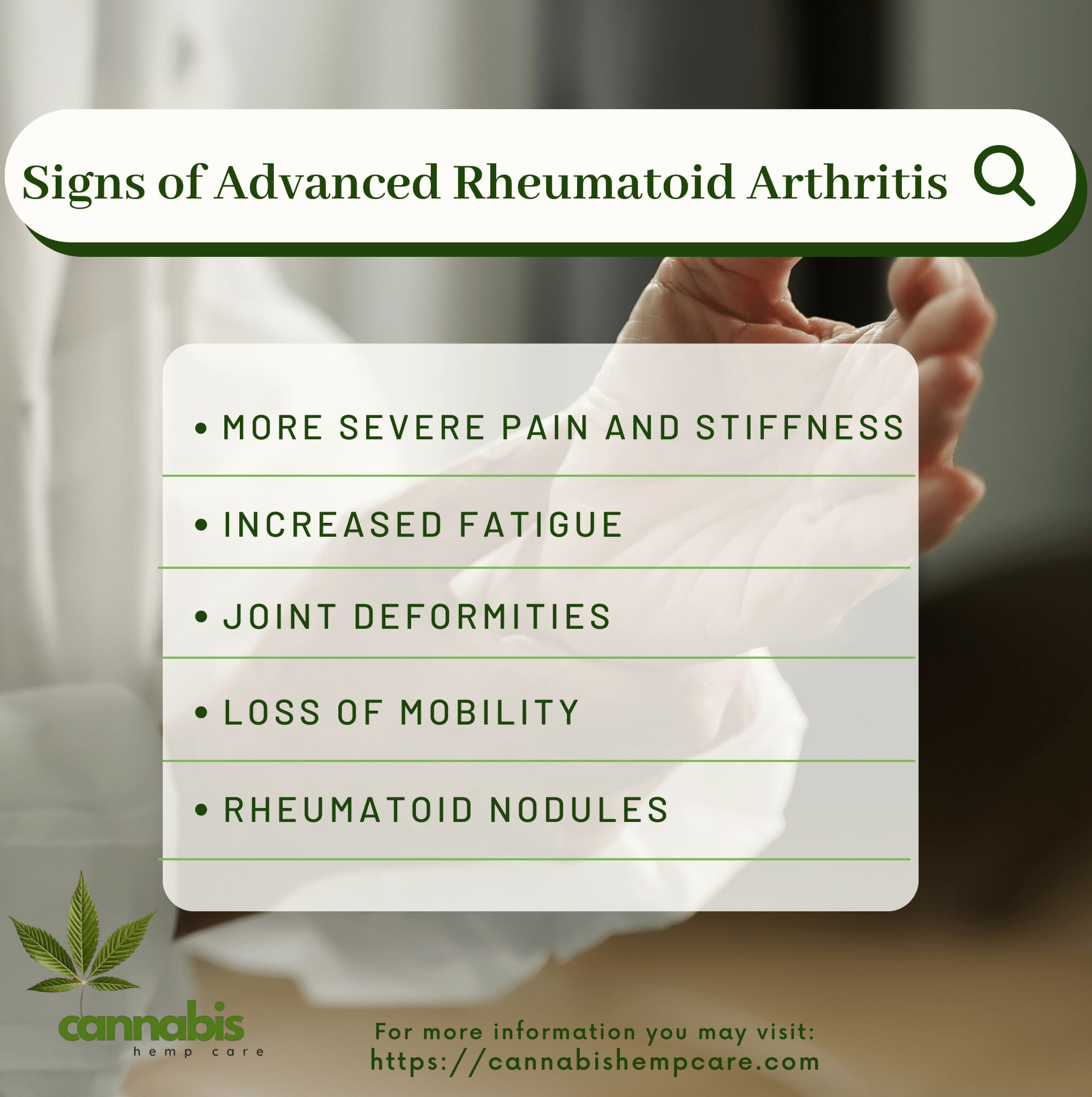Understanding whether your Rheumatoid Arthritis (RA) has advanced is essential for proper treatment. Here are some easy-to-understand signs and explanations.
What is Rheumatoid Arthritis (RA)?
Rheumatoid arthritis is a chronic autoimmune disorder in which your immune system mistakenly attacks your body’s tissues. In RA, it primarily affects your joints.

How Does RA Progress?
RA tends to start slowly, often in small joints like those of the fingers and toes. As it advances, it usually spreads to both sides of your body, affecting large joints such as the wrists, knees, ankles, elbows, hips, and shoulders.
So, What are the Signs of Advanced RA?
Let’s dive deeper and provide more in-depth knowledge about advanced RA. Let’s think of your body as a house. Your joints are like the doors and windows that allow you to move and do things. In RA, your body’s immune system, which is usually the security guard, starts attacking the doors and windows mistakenly. This can damage your house over time.

- More Severe Pain and Stiffness: In the beginning, you might feel like your doors (joints) are just a little creaky. But as RA advances, the creakiness turns into pain. Imagine trying to open a rusty door – it feels stiff, and you might need some oil (medications) to ease the movement.
- Increased Fatigue: RA can make you feel constantly tired. Imagine if your house is leaking, and you’re constantly trying to clean up. That’s what your body is doing, trying to fight off the mistaken attack, and it gets tired.
- Joint Deformities: Over time, your doors (joints) can get misaligned or crooked. This is visible as deformities in your fingers, wrists, or other joints. It’s like the hinges on the doors have been damaged from the constant attack.
- Loss of Mobility: If the doors in your house can’t open and close properly, it gets hard to move around. Similarly, severe RA can make it difficult to move your joints, affecting your ability to do everyday tasks like cooking, dressing, or even walking.
- Rheumatoid Nodules: These are firm lumps that grow under the skin near the affected joints. It’s like your house is showing signs of wear and tear from the outside.

Why Does This Happen?
The exact reason isn’t known, but it’s a combination of factors like your genes (the blueprint of your house), environmental factors like smoking (the weather that affects your house), and hormones (the quality of the materials in your house).
How Can You Protect Your House (Body)?
- Regular Check-ups: Just like a house needs regular maintenance, you need to see your doctor often.
- Medications: These are like the tools and repairs needed to fix the damage.
- Lifestyle Changes: Eating healthy, exercising, and managing stress are like keeping your house clean and clutter-free.
- Listen to Your Body: If you notice new pain or lumps, it’s like your house is sending you an SOS signal. Don’t ignore it.
- Stay Informed: Knowledge is power. Keep learning about RA, just like you’d learn about maintaining a house.
How Is Advanced RA Diagnosed?
- Physical Examination: Your doctor will look for joint swelling, redness, and warmth.
- Blood Tests: These can measure inflammation levels and detect autoantibodies associated with RA.
- X-rays: These can track the progression of RA in your joints over time.
Can You Manage Advanced RA?
Yes, advanced RA can be managed, but early detection is crucial.
- Medications: Your doctor might recommend NSAIDs, corticosteroids, DMARDs, or biologics.
- Physical Therapy: Helps to keep your joints flexible.
- Surgery: In extreme cases, you might need a joint replacement.
- Lifestyle Changes: Eating a balanced diet, exercising, quitting smoking, and managing stress can help.

Can Advanced RA Be Prevented?
Alright, let’s put it in simple terms: imagine your body is like a garden, and Rheumatoid Arthritis (RA) is like a weed that’s growing in it. Left unchecked, the weed can spread and take over the entire garden. This is what we call “Advanced RA.” Now, it might not be possible to prevent the weed from growing initially, but you can manage and control it so it doesn’t take over the whole garden. That’s the goal in managing RA.
So, here’s what it means in the context of RA:
1. Early Treatment:
- What does this mean? Just like you would start removing the weed as soon as you see it, similarly, starting treatment early is important. The earlier you start, the better chance you have to slow down RA’s progression.
- The Science Behind It: RA causes inflammation in the joints, and over time, this inflammation can cause damage. Early treatment helps to control this inflammation before it can cause significant damage. It’s like removing the weed before it can spread too much.
2. Aggressive Treatment:
- What does this mean? Sometimes, just pulling out the weed isn’t enough; you might need stronger tools or more help. Similarly, aggressive treatment might involve stronger medications or a combination of treatments to keep RA in check.
- The Science Behind It: RA can be a stubborn disease, and sometimes, it doesn’t respond well to standard treatments. In such cases, doctors might recommend a combination of drugs or higher doses to effectively manage it. Think of it as using a combination of gardening tools to get rid of the stubborn weed.
3. Lifestyle Changes:
- What does this mean? Sometimes, to keep a garden healthy, you need to do more than just remove the weeds. You might need to water it more, add some fertilizer, or maybe even change the type of plants you have. Similarly, lifestyle changes can help in managing RA better.
- The Science Behind It: Factors like a balanced diet, regular exercise, stress management, and getting enough sleep can help reduce inflammation and support overall health, which is essential in managing RA. It’s like providing the right care and environment for your garden to flourish.
4. Regular Check-ins with Your Doctor:
- What does this mean? Just like a gardener who regularly checks on the garden to make sure everything’s alright, regular check-ins with your doctor are crucial to track your RA and adjust treatments as needed.
- The Science Behind It: RA can change over time, and what works initially might not be as effective later on. Regular check-ins help your doctor assess the current state of your RA and make any necessary changes to your treatment plan. It’s like a gardener adjusting the care based on the current state of the garden.
Preventing RA from advancing to a severe stage involves early and aggressive treatment, making lifestyle changes, and regular check-ins with your doctor. It’s all about managing the ‘weed’ in your ‘garden’ and providing the right care to keep it healthy. While you might not be able to completely prevent the ‘weed’ from growing, you can definitely prevent it from taking over your entire ‘garden.’

Conclusion
Understanding the signs of advanced RA is crucial for early intervention. With proper treatment, lifestyle changes, and regular check-ups with your doctor, you can manage advanced RA and continue to live an active and fulfilling life. Don’t let RA stop you from enjoying your favorite activities. Remember, you’re not alone in this journey, and help is always available.
FAQs
How quickly does rheumatoid arthritis spread?
The progression of rheumatoid arthritis (RA) varies among individuals and depends on factors like age, overall health, and the effectiveness of treatment. Typically, RA may progress more quickly within the first few years of diagnosis. However, with appropriate treatment, the progression can be slowed down.
How do you stop rheumatoid arthritis from progressing?
Stopping RA from progressing involves a combination of early and aggressive treatment, lifestyle changes, and regular check-ups with a rheumatologist. Medications like DMARDs, biologics, and NSAIDs are often prescribed to reduce inflammation and slow disease progression. Lifestyle changes, such as maintaining a healthy diet, exercising regularly, managing stress, and avoiding smoking, can also play a crucial role.
How can I prevent my rheumatoid arthritis from getting worse?
Preventing RA from getting worse involves similar strategies to stopping its progression. Adherence to prescribed medications, regular check-ups with a healthcare professional, and making healthy lifestyle choices are key factors. Additionally, working with a physical therapist and following an exercise regimen that strengthens muscles around the joints can help support joint function and reduce pain.
What is the most successful treatment for rheumatoid arthritis?
The most successful treatment for RA is often a combination of approaches tailored to the individual’s needs. This typically includes a mix of medications, physical therapy, and lifestyle changes. Medications like DMARDs (Disease-Modifying Antirheumatic Drugs), biologics, and NSAIDs are common treatments that can reduce inflammation and slow the progression of the disease. However, the most effective treatment plan can differ among individuals, and it’s essential to work closely with a healthcare professional to determine the best approach.
What vitamins help rheumatoid arthritis?
Some vitamins and supplements may help in managing RA, but it’s important to consult with a healthcare professional before adding any to your regimen. Some commonly recommended supplements for RA include:
Omega-3 Fatty Acids: Found in fish oil, they can help reduce inflammation.
Vitamin D: It’s important for bone health and immune function, and many people with RA have low levels of Vitamin D.
Turmeric and Curcumin: These supplements may help reduce inflammation and pain.
Glucosamine and Chondroitin: These are often used for osteoarthritis and may help in RA as well.
Antioxidant Vitamins: Vitamins A, C, and E may help reduce inflammation and ease RA symptoms




































